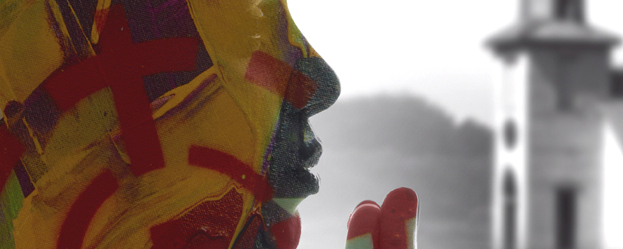This website uses cookies so that we can provide you with the best user experience possible. Cookie information is stored in your browser and performs functions such as recognising you when you return to our website and helping our team to understand which sections of the website you find most interesting and useful.
Caro Meets Theatre Interview
Silva Semerciyan: I And The Village
By Caro Moses | Published on Tuesday 9 June 2015

Award winning playwright Silva Semerciyan’s latest work, ‘I And The Village’, begins a run at London’s Theatre503 this week. The play is set in the US-born writer’s home state of Michigan, and deals with a thorny topic involving youth, non-conformity, and guns.
I sent some questions over to Silva, to find out more about the show and its inspirations, as well as a wee bit about the playwright herself.
CM: Could you start by telling us what ‘I And The Village’ is about? What’s the basic premise?
SS: It’s about a teenage girl called Aimee, who rebels against her hometown by walking into a church with a gun.
CM: What themes does the play focus on?
SS: It focuses on the multiple ways in which young people are ‘tagged’, what happens to those who don’t conform, and America’s devotion to guns.
CM: What gave you the idea for this? What made you decide this would make good theatre?
SS: I read about a church shooting and was really shocked. All mass shootings are, of course, utterly heinous crimes, but it seemed especially reprehensible to transgress against a symbol of sanctuary. I did further research, trying to understand what could possibly motivate someone to do it. There seemed to be a common thread of a history of intense devotion which had been shattered by some sudden disillusionment and a desire to make a private grief a public event. I began to think, what if something like this were to take place in my part of Michigan? And what if the perpetrator were the girl next door? Cinema and television can offer an objective representation of an event like this, but only live theatre can actually place an audience in a position to experience the event like the churchgoers themselves.
CM: You’ve drawn on experiences from your own home town for this, haven’t you? Are there any biographical elements?
SS: Van Vechten is a fictional town, but I’ve borrowed imagery from several coastal towns in south west Michigan. There aren’t any autobiographical plot elements, but some of my own experiences, like the one time I went sailing on Lake Michigan, have been transformed into something else. My brother and I used to climb the TV antenna to sit on our roof, and that has become one of the locations in the play.
CM: Does the show have a political agenda? Do you have a particular point to make about gun culture?
SS: I didn’t set out with an overt political agenda and my view of guns is slightly conflicted. My parents would never have dreamed of owning a gun, but we had close family friends who hunted (and ate) game from the forests of Michigan. My concern is about the impact of widespread gun ownership on a collective quality of life. One person’s right to own a gun shouldn’t mean that another has to live under a constant threat. ‘I and the Village’ explores multiple forces that may be working to erode the sense of fraternity between citizens, and guns are one of them.
CM: How did you end up in the UK? Is it your home now?
SS: I met my English husband during my first trip away from America and moved here to be with him. My parents, who still live in the states, sometimes jokingly rue the day they drove me to Chicago to get a passport. The UK is my home now, and I really love living here. That’s not to say I don’t miss home. Actually, one impetus for writing ‘I and the Village’ was homesickness.
CM: Did you always want to be a playwright? As a writer, do you have many major influences?
SS: When I was sixteen I wrote a skit for my high school variety show and had my first experience of hearing an audience laugh at my words. Around the same time, I performed in ‘Macbeth’ (I was Fleance – remember him?) with the drama club and was thrilled to my core by the final stand-off between Macbeth and Macduff which I watched from off-stage. I was completely bewitched by theatre. But it wasn’t until I was three years into university, studying for a BA in English, that I finally took a playwriting class. My first playwriting teacher, Ari Roth, encouraged us to try to take something away from everything we read or saw, so the influences are numerous. ‘I and the Village’ specifically owes a debt to Georg Büchner, Thornton Wilder, and Paula Vogel.
CM: What advice would you have for an aspiring playwright?
SS: Ultimately, you have to be the final judge of what’s right for your play. Playwrights, and especially aspiring playwrights, are often bombarded with feedback, constructive or otherwise, and while it’s good to be open to suggestions, you may get conflicting advice. Take it all in and let it settle for a while before rampaging through your script with a red pen.
CM: What’s next for you? Any new works on the way…?
SS: Next, I plan to finish the play I began while on attachment at the National Theatre Studio last year. It’s about the unseen and often unpaid contributions of women to society and how these can impact on their own prosperity and well being.
‘I And The Village’ is on at Theatre503 until 4 Jul. See this page here for more info and tickets.
LINKS: theatre503.com | twitter.com/silvasemerciyan






